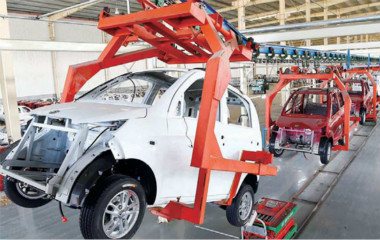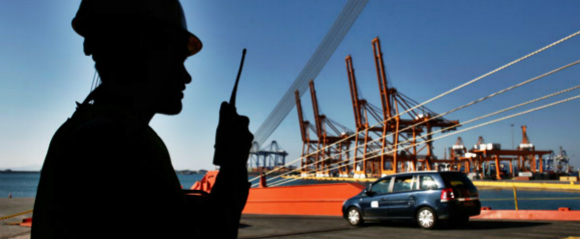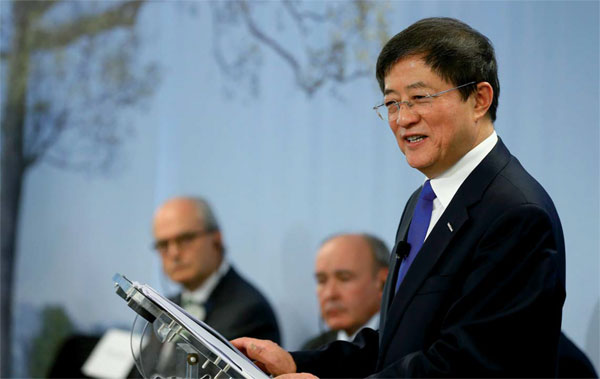Expanding footprint
Updated: 2016-03-04 07:58
By Chris Peterson(China Daily Europe)
|
|||||||||
|
Ren Jianxin (right), chairman of China National Chemical Corp, makes a speech during the Swiss agrochemicals maker Syngenta's annual news conference in Basel on Feb 3. ChemChina has made a $43 billion bid for Syngenta. [Photo/Agencies] |
The Silk Road Fund, a government-owned investment vehicle, was launched at the end of 2014 with an injection of $40 billion. It aims to support infrastructure projects, mainly in Eurasian countries that lie along the proposed Silk Road Economic Belt and the 21st Century Maritime Silk Road routes between China and Europe.
More to the point, Chinese state and private companies see the Belt and Road Initiative as a clear signal that the government wants them to look overseas.
"A lot of SOEs are fairly cash-rich," Ben Cavender of China Market Research Group told nasdaq.com recently. "One of the issues they are running into is they're out of room to grow in their home market."
It was inevitable that the big deals would make headlines.
Probably the most eye-catching came in February, when China National Chemical Corp - or ChemChina - agreed to pay $43 billion for Swiss pesticide maker Syngenta. If shareholders and regulators approve the deal, it will be the largest-ever Chinese takeover of a foreign company.
The chemical company had already hit the headlines for buying Italy's premium tire maker, Pirelli, for $7.7 billion. The deal was funded in part by the Silk Road Fund, which took a 25 percent stake in the ChemChina unit set up to buy Pirelli's shares, nasdaq.com reported.
Wang Jianlin, chairman of Dalian Wanda Group and the world's 29th richest man, has forthright views on foreign acquisitions.
"Any time is good for an M&A," he told business students in a speech at Oxford University last week. "It's hard to determine when it's inexpensive and when it's expensive. It may be the case if you look at your investment on a two to three year time span, but if you take a long-term view, say 10 years, then it really doesn't matter."
Intense scrutiny
Merger activity can have its challenges, however.
Most analysts widely accept that the US, although a huge market, has a series of regulatory hurdles, as well as a Congress that at times seems highly protectionist.
For example, a move by Chinese investors led by GSP Ventures to acquire an 80 percent stake in Dutch company Philips' lighting and auto unit fell through after the powerful US Committee for Foreign Investment vetoed the move on security grounds. Philips has several US government contracts.
The committee is an interdepartmental agency that scrutinizes all foreign investment in the US, including takeovers and acquisitions. It reports to Congress and often focuses on national security implications. There have been a number of proposed deals in which the acquirer, faced with opposition from the committee, has walked away rather than mount an expensive legal challenge.
Zoomlion, the Chinese construction equipment maker, is eager to acquire Terex, a US crane maker, and has offered $3.3 billion, roughly double what Terex's shares were worth in January. But that may run into problems with the US Committee for Foreign Investment, according to Reuters.
ChemChina's bid to take over Syngenta is likely to face similar scrutiny, too, since the Swiss company does a lot of business in the US.
"The US claims to be a free country, but for investing, there are many complicated approval processes," Wang said in his speech in Oxford. "They can easily take back your license after 50 years.
"The United Kingdom and the US are equally important countries. I've invested $10 billion in the US because it's a big market, but the UK is the freest market in the world."
Despite challenges, the foreign merger route remains a desirable one for Chinese companies. Many executives see it as a way of acquiring know-how to help the country shift focus from "made in China" to "designed in China".
"M&A deals are an important ingredient in China's state-driven transition and development strategy," Danae Kyriakopoulou, senior economist at London's Centre for Economics and Business Research, told China Daily. "This is because Chinese companies need to acquire the know-how of the new growth sectors in order to support the economy's rebalancing away from being the world's hub for basic manufacturing and heavy industry and toward high-end economic activities, and M&As with companies of those more-developed economies in those sectors is a way to do that."
Chinese companies are being encouraged to seek merger targets abroad, buoyed by supportive government policies that have reduced paperwork and eased restrictions on overseas investment, adds Duncan Innes-Kerr, regional director for Asia at the Economist Intelligence Unit.
"The slowdown in China's economic growth has added momentum to the trend," he says. "Chinese firms are looking beyond the traditional fields that they used to invest in, like resources, and are now increasingly seeking to acquire talent, technology and access to high-margin markets in developed economies."
Other analysts agree. Professor Alan Barrell of the Centre for Entrepreneurial Learning at Cambridge University's Judge Business School says: "It makes enormous sense for a cash-rich economy such as China to spread its wings and grow internationally by acquisition, and to explore sectors as yet unexploited overall by M&As involving overseas companies and assets, notably technology, and not just real estate."
Today's Top News
Lavrov, Kerry hail progress in Syrian ceasefire
PM Fico's Smer party leads Slovak election: exit poll
Britain to take lead in promoting EU-China trade talks
Chinese brands make a mark in Europe
Expanding footprint
Spanish Princess testifies in tax fraud trial
Women driving growth of O2O in China
Trump, Clinton scoop up key wins on 'Super Tuesday'
Hot Topics
Lunar probe , China growth forecasts, Emission rules get tougher, China seen through 'colored lens', International board,
Editor's Picks

|

|

|

|

|

|







